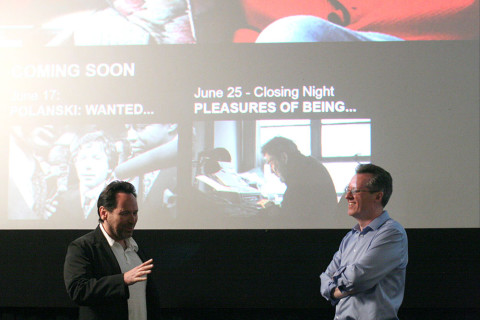
Filmmaker Barry Avrich answers audience questions following the STF screening of his film about Hollywood mogul Lew Wasserman. © Jasmin Chang
This post was written by STF blogger Krystal Grow.
There was a time when movies were made by men with relentless energy and a uncompromising quest for greatness who made some of the biggest films in Hollywood history possible, and changed the landscape of how major motion pictures were made forever.
Lew Wasserman grew up on the “rat infested” east side of Cleveland and got his start in show business in speakeasies and brothels in the 1920s, where he became good friends with rising stars and influential mobsters. In 1936, he became a publicist for MCA, then a musical booking agency with intricate ties to the Chicago mob. By 1938, MCA was managing 90 percent of the Chicago’s nightlife talent.
Over the next four decades, Wasserman transformed MCA from a one-trick booking agency to a multi-platform conglomerate, producing radio shows and motion pictures, and later spearheading the company’s foray into television, a move many other entertainment agencies and media companies were reluctant to make. But Wasserman, now a power player in Hollywood with a roster of influential friends, executed a strategy that allowed him and his company to dominate a fledgling medium, producing shows like Alfred Hitchcock Presents, Amos and Andy, Dragnet, Wagon Train and The Jack Benny Program.
He also pioneered the TV mini-series, an innovation that further solidified his role as a force to be reckoned with in the increasingly competitive world of movies and television. In a deal that was unheard of for it’s time, he brokered the purchase of Paramount Pictures’ entire pre-1950s archive, which he ran in syndication, another first for the last great Hollywood mogul.
As famous for his commanding demeanor as he was for his resistance to accolades and public appearances, Wasserman captivated director Barry Avrich to follow his career for much of his life. Avrich committed to the idea of making a film about his legendary status among Hollywood high rollers.
“I was one of those nerdy kids reading Variety from age eight, so I followed him and I watched him and I was amazed at him and the entirety of his career. I knew that this was going to be a complex film to make about six decades of power,” Avrich said in a Q&A following the screening of the film at the Stranger than Fiction series at the IFC Center. A revealing look into the man behind mega hits like JAWS, THE STING and AMERICAN GRAFFITI, THE LAST MOGUL is a film as much about an individual career as it is about an entire industry, one that’s seen drastic change at the hands of technology, consumer culture and the constantly evolving Hollywood studio system. It’s a chronicle of one man’s unprecedented rise to power, and a shocking and complicated series of missteps and bad deals that led to his demise. But the legend he left in his wake shaped the way Hollywood as a whole functioned, and left generations of would-be moguls still struggling to achieve even a fraction of his greatness.
FULL Q&A
Thom Powers: What got you started on making a film about Lew Wasserman?
Barry Avrich: I met Lew and I told him I wanted to make a film about him and he said, ‘It’ll never happen whether I’m alive or dead.’
Powers: What did you know about Wasserman that made you want to know more about his career?
Avrich: I was one of those nerdy kids reading Variety from age 8, so I followed him and I watched him and I was amazed at him and the entirety of his career. I knew that this was going to be a complex film to make six decades of power. And the Wasserman family came after me big time. I’d have interviews scheduled with major power players and [the family] would make phone calls and say, “No, you’re not going to participate in that film” and then I’d have doors slammed in my face, and in studios setting up. I was followed. I was threatened.
Powers: But for all that you have some incredible power players, Jack Valenti, President Jimmy Carter, big producers…






